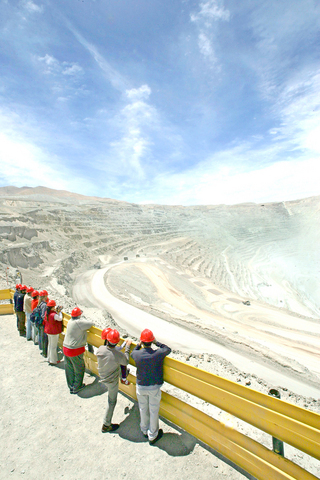Deep in a vast hole in the earth, huge trucks crawl about like insects on a mission: This is Chuquicamata, the world's biggest open pit mine, an oddball tourist draw in Chile's desert and the origin of tonne after tonne of China-bound copper.
Every afternoon, a bus belonging to Codelco, the world's biggest copper concern, drops about 50 visitors off at a viewing area with an eye-popping panoramic view of the pit mine, in the middle of the Atacama desert, about 1,000km north of Santiago.
"We get about 35,000 visits every year" plus schoolchildren and technicians, spokesman Patricio Huerta says.

PHOTO: AFP
Many are backpacking young people, particularly Europeans, who follow the route of fabled Argentine-Cuban "guerrillero" Ernesto "Che" Guevara, who back in 1952 spent time at "Chuqui" learning about the grim conditions in which miners were living.
Like all of Chile's biggest mining operations, copper mining at that time was in the hands of US investors, namely the Guggenheim brothers.
In 1971, then-president Salvador Allende nationialized the mines and Codelco workers are widely considered to be blessed with good pay and working conditions.
Over the past 90 years as industrial development spiralled worldwide, Chuquicamata grew.
Additional mines nearby were opened such as Radomiro Tomic and Mina Sur.
But they pale in all comparisons to the impressive "Chuqui," which stretches 4.3km long, 3km wide and and plunges 825m down into the earth.
Copper prices' upward march on world markets, and soaring Chinese demand, are plain to see at Chuquicamata, where the business of bringing out the ore roars on 24 hours a day.
Jorge Tenorio, 56, watches with an expert's knowing stare as huge red plates of copper -- fresh out of the foundry-refinery -- are marked with "CCC" (Compaqma Codelco Chile) and loaded up before being sent to port at Antofagasta and Mejillones for export.
"It has been a year or two that shipments have been really strong to Asia -- to China and South Korea. It used to be mainly to the United States and Europe. Now, there are Chinese missions, Chinese who come to see `Chuqui,'" says Tenorio, who is in charge of the copper refinery's shipping unit. "They take a lot of pictures, ask questions, and see our products."
"There are Chinese engineers who come to check on our prod-ucts. They are really interested," Tenorio said. "They are demanding, but our product is top-notch."
Codelco has stepped up development of the north section of the mine, on which Codelco now relies heavily, to try to push annual output from the three Atacama desert mines from 900,000 tonnes -- 65 percent of Codelco's output -- to more than a million tonnes a year.
And plans are under way to take Chuqui wider and deeper. For now, the copper is not close to running out.
Experts estimate that in 90 years of operation, only about one third of the copper in the area has been mined.

The CIA has a message for Chinese government officials worried about their place in Chinese President Xi Jinping’s (習近平) government: Come work with us. The agency released two Mandarin-language videos on social media on Thursday inviting disgruntled officials to contact the CIA. The recruitment videos posted on YouTube and X racked up more than 5 million views combined in their first day. The outreach comes as CIA Director John Ratcliffe has vowed to boost the agency’s use of intelligence from human sources and its focus on China, which has recently targeted US officials with its own espionage operations. The videos are “aimed at

STEADFAST FRIEND: The bills encourage increased Taiwan-US engagement and address China’s distortion of UN Resolution 2758 to isolate Taiwan internationally The Presidential Office yesterday thanked the US House of Representatives for unanimously passing two Taiwan-related bills highlighting its solid support for Taiwan’s democracy and global participation, and for deepening bilateral relations. One of the bills, the Taiwan Assurance Implementation Act, requires the US Department of State to periodically review its guidelines for engagement with Taiwan, and report to the US Congress on the guidelines and plans to lift self-imposed limitations on US-Taiwan engagement. The other bill is the Taiwan International Solidarity Act, which clarifies that UN Resolution 2758 does not address the issue of the representation of Taiwan or its people in

US Indo-Pacific Commander Admiral Samuel Paparo on Friday expressed concern over the rate at which China is diversifying its military exercises, the Financial Times (FT) reported on Saturday. “The rates of change on the depth and breadth of their exercises is the one non-linear effect that I’ve seen in the last year that wakes me up at night or keeps me up at night,” Paparo was quoted by FT as saying while attending the annual Sedona Forum at the McCain Institute in Arizona. Paparo also expressed concern over the speed with which China was expanding its military. While the US

SHIFT: Taiwan’s better-than-expected first-quarter GDP and signs of weakness in the US have driven global capital back to emerging markets, the central bank head said The central bank yesterday blamed market speculation for the steep rise in the local currency, and urged exporters and financial institutions to stay calm and stop panic sell-offs to avoid hurting their own profitability. The nation’s top monetary policymaker said that it would step in, if necessary, to maintain order and stability in the foreign exchange market. The remarks came as the NT dollar yesterday closed up NT$0.919 to NT$30.145 against the US dollar in Taipei trading, after rising as high as NT$29.59 in intraday trading. The local currency has surged 5.85 percent against the greenback over the past two sessions, central